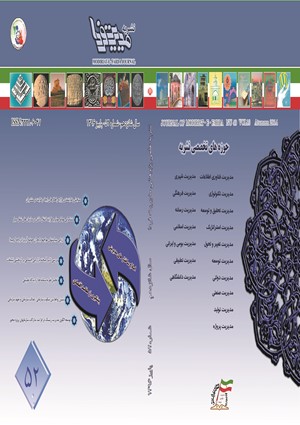شناخت مؤلفه های فرهنگ سازمانی و اثر آن بر ابعاد توانمند سازی منابع انسانی (مورد مطالعه: شهرداری مشهد)
محورهای موضوعی : مدیریت شهری
یوسف رمضانی
1
*
,
فریبرز رحیم نیا
2
,
سعید مرتضوی
3
![]() ,
غلامرضا ملک زاده
4
,
غلامرضا ملک زاده
4
1 - موسسه آموزش عالی عطار
2 - دانشگاه فردوسی مشهد
3 - دانشگاه فردوسی مشهد
4 - دانشگاه فردوسی مشهد
کلید واژه: فرهنگ فرهنگ سازمانی قوم نگاری توانمند سازی منابع انسانی شهرداری مشهد.,
چکیده مقاله :
اهمیت فرهنگ در بکارگیری توانائیهای افراد در سازمان غیر قابل انکار است. این تحقیق در تلاش است تا در بستر حقیقی سازمان در جامعه ایرانی، مولفه های فرهنگ سازمانی حاکم بر شهرداری مشهد را شناسایی و اثر آن را بر ابعاد توانمند سازی منابع انسانی بررسی نماید. روش تحقیق در این مطالعه قوم نگاری است. در این تحقیق با ورود به یک سازمان محلی و استفاده از ابزارهای مشاهده و مصاحبه به شناخت فرهنگ سازمانی آن پرداخته شد و از تحلیل اطلاعات 11 مولفه شامل؛احترام به شعائر و ارزشهاي مذهبي،تبعیت پذیری،رفتارهاي رسمي، هويت سازماني، نمادهاي فيزيکي، فرد محوری، شعار تکريم ارباب رجوع، درآمدزايي، تاکید بر قوانين سازمانی، مقاومت در برابر مدیران بیگانه وزبان،در پنچ سطح مصنوعات (زبان) مصنوعات (نمادها) مصنوعات (الگوهای رفتاری)، ارزشها و مفروضات و باورهای اساسی بدست آمد. جهت تأیید استحکام دادهها در بخش کیفی این پژوهش از قابلیت اعتبار، قابلیت اعتماد، قابلیت وابستگی و قابلیت انتقال استفاده شد. در بخش کمی نیز جهت سنجش روایی پرسشنامهها از دو روش روایی محتوا و روایی سازه بهره گرفته شد و جهت سنجش پایایی پرسشنامهها نیز از آلفای کرونباج استفاده شد(پرسشنامه فرهنگ سازماني 701/0، پرسشنامه توانمند سازي 857/0). همچنین نتایج، اثر معنادار فرهنگ سازمانی بر ابعاد توانمند سازی منابع انسانی را نشان می دهد.
The importance of culture in the use of the ability of people in the organization is undeniable. This research is trying to true in the context of the organization in Iran, Mashhad Municipality to identify the components of organizational culture and its effect on the human resources dimension empowering human resources In this study, ethnographic is research method. In this study, by entering a local organization and means of observation and interviews was to understand the organizational culture and the analysis of 11 components, including: respect for the beliefs and religious values,adherence to accountability, formal behavior, organizational identity, physical symbols, personalized, banner honoring customers, revenue, emphasis on corporate law, resistance against foreign managers and language, in five levels artifacts (language), artifacts (symbols), artifacts (Meme), values and basic assumptions and beliefs respectively. To verify the integrity of the data in this study, the reliability, quality, reliability, functionality and portability dependence was used. In the quantitative as well as to assess the validity of the content validity and construct validity were used two methods to assess the reliability of the questionnaire was Krvnbaj alpha (organizational culture questionnaire 0/701, 0/857 empowerment questionnaire). The results indicate that a significant effect of organizational culture on human resources shows the dimensions of empowerment.
1- آقايار، سيروس،(1382). توانمندسازي روش نوين در محيط رقابتي، ماهنامه ي تدبير، شماره 135.
2- اسكات، سينتا و ژاف، د نيس تي، (1383). تواناسازي كاركنان، ترجمه ي ايران نژاد پاريزي، مهدي، كرج: مؤسسه ي تحقيقات و آموزش مديريت.
3- امامي، مصطفي، نظري، کامران (1392). توانمندي کارکنان و فرهنگ سازماني مطالعه موردي در بانکها خصوصي شهر کرمانشاه، مجله بانک و اقتصاد، شماره 123.
4- دانایی فرد، حسن، الوانی، سید مهدی، آذر، عادل، (1383). روش شناسی پژوهش کیفی در مدیریت: رویکردی جامع، تهران: صفار.
5- دلاور، علي،(1388). احتمالات و آمار کاربردی، تهران: انتشارات آرین.
6- رجب بيگي، مجتبي، فروزنده دهكردي، لطفعلي، وايزي، افسون، (1388). عوامل مؤثر بر توانمندسازي دانشگران پژوهشگاه صنعت نفت، فصلنامه ي علوم مديريت ايران، سال 4، شماره14.
7- زارعي متين، حسن، (1387). مباني سازمان و مديريت "رويكرد اقتصادي، تهران: انتشارات دانشگاه تهران.
8- شائمي برزکي، علي، حاتم پور آذرخواراني، فاطمه، رادمهر، رضا،(1392). رابطه فرهنگ سازماني و توانمندسازي کارکنان دانشگاه علوم پزشکي اصفهان، مجله تحقيقات نظام سلامت ، سال نهم، شماره 6.
9- عبودي، حميد، لطفي زنگنه، درويش، کاظميان، فرشته،(1393). رابطه فرهنگ سازماني با توانمندسازي کارکنان، فصلنامه پژوهشهاي مديريت منابع انساني دانشگاه جامع امام حسين (ع)، سال ششم، شماره 1.
10- مؤمني، ماندان، پرگاري، صغرا، (1389). بررسي رابطه ي فرهنگ سازماني و توانمندسازي كاركنان ستادي شركت مهندسي و توسعه ي گاز ايران، مديريت دولتي.
11- Atkinson, P., Coffey, A., Delamont, S., Lofland, J., & Lofland, L. (Eds.). (2007). Handbook of ethnography. Sage.
12- Creswell, J., W. and V. L Plano Clark, (2007). Designing and Conducting Mixed Methods Research, London: Sage Publication Inc.
13- Deul, T.E & Kennidy, A.A. (1982), Corporate Caltare: The Rites & Rituals of Corporate Lif, Addison – Wesly, M.A.U.S.A.
14- Denison, D and Mishra, A.N., (1995) Toward a theory of organizational culture and effectiveness, Organization Science, Vol. 6, No. 2 .
15- Fetterman, D. M. (1998). Ethnography: Step-by-step (2ed Ed.). Sage.
16- Kotter, John p. and JamesL heskett, (١٩٩٢). Corporate Culture and Performance, New York, The free press
17- Peters TJ. Waterman RH. (1982). In search of excellence: 13. Lesson from Americans best run companies. New York: Harper& Row.
18- Schein, E.H. (2004). Organizational Culture and Leadership. San Francisco, CA, Jossey-Bass.
19- Shrazi, A. (2010). Management and organization basics. Mashhad,Iran: Astane Ghods Press; [In Persian]

